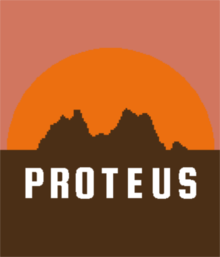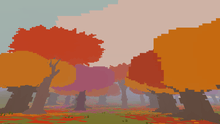Proteus (video game)
| Proteus | |
|---|---|
 | |
| Developer(s) | Ed Key and David Kanaga |
| Designer(s) | Ed Key |
| Composer(s) | David Kanaga |
| Engine | Custom |
| Platform(s) | Linux, Mac OS, Microsoft Windows, PlayStation 3, PlayStation Vita |
| Release date(s) | Windows, Mac 30 January 2013[1] Linux 8 April 2013[2] PlayStation 3, PlayStation Vita 29 October 2013[3] |
| Genre(s) | Open world exploration |
| Mode(s) | Single-player |
Proteus is a 2013 open world exploration video game developed by Ed Key and David Kanaga for Linux, Mac OS, Microsoft Windows, PlayStation 3, and PlayStation Vita. The game was released on 30 January 2013 for Windows and Mac, and on 8 April 2013 for Linux. PlayStation 3 and PlayStation Vita versions were later released on 29 October 2013. The game is based around adventuring and discovering an island, with no specific goals. Players explore an environment in which every creature and plant has a unique musical signature, which results in changes in audio depending on the area. The game world is procedurally generated, creating a unique layout each game.
Ed Key began the game's development in 2008 and was joined by David Kanaga in 2010; the two aimed to make a "nontraditional and nonviolent" game.[4] They considered different game mechanics, including quests, before settling on the final game design. Curve Studios developed the PlayStation 3 and PlayStation Vita versions and added extra features to the Vita version at Sony's behest.
Proteus won the prize for Best Audio in the 2011 Indiecade awards and was a finalist for the 2012 Independent Games Festival's Nuovo Award. Critics received both the original and PlayStation releases well, specifically praising the game's use of audio, though some reviewers commented negatively on the length and replayability. Many players debated whether Proteus could be defined as a video game, and it was sometimes described as an anti-game.
Gameplay
In Proteus, players explore an island from a first-person perspective. The island is drawn in a pixel art style and contains hills, trees, structures, and animals such as frogs and rabbits. Its layout is different each time the game is played.[5][6][7] The focus of the game is on exploration rather than interaction, as there is no narrative and the player is given no instructions on how to proceed.[8] Possible interactions are limited—for example, animals may run away when players come too close.[9] The soundtrack changes depending on the player's movements and location. It may become silent when the player is at the top of a hill or sonically dense as they travel down. The soundtrack will add extra sounds and notes when the player nears objects or animals.[10]

When the game begins, players are situated away from the island and must move across an ocean of water to reach it.[10] Upon arrival, players are free to explore all of the island during the initial season of spring. During nighttime, players can enter a cluster of lights to advance time to the next season; going through each until the end of winter, after which the game ends. The landscape changes with the season, such as trees shedding their leaves in autumn.[7][11]
The PlayStation Vita version lets the player directly affect the environment with the console's rear touch panel and generate islands based on the current date and location in the real world.[12][13]
Development
British developer Ed Key began work on Proteus in 2008 during his evenings and weekends. The game only neared its final form when David Kanaga joined development in 2010.[14][15] Key originally envisioned the game as a procedural role-playing game in the same vein as The Elder Scrolls IV: Oblivion, in which the player would visit towns and complete quests. Realizing the extent of the work that would be needed for such a game, the developers decided to instead make something "nontraditional and nonviolent".[4]
Key developed the game using a game engine he had written in the C# programming language. The developers expressed interest in allowing player-created mods of the game; some such modified versions of the game have since been created by the community.[15][16][17] After David Kanaga joined the development team as audio composer, the audio mechanics were refined through many different ideas, such as allowing players to create their own music within the game. This idea was cut because the developers felt it would detract from the exploratory emphasis of the game and turn it into more of a creative tool.[18]

Proteus was released on 30 January 2013 for Windows and Mac, and on 8 April of the same year for Linux.[1][2] When pre-orders were open in 2012, an Artifact Edition was also available; a version which included a boxed version of the game with artwork, the soundtrack, and notes on the game's development.[19] Key apologised when the Artifact Edition was still in development and unshipped at the end of its release year, and offered to refund customers upon request.[20] As of May 2014 the edition has not been released.[21]
Around the time of the game's release, Curve Studios approached, and later worked with, the developers to port the game for release on PlayStation 3 and Vita.[22][23] These versions of the game use Curve Studio's own game engine.[24] Sony requested that new features be added to the game, though Key said that the company never attempted to steer the direction of the development of these features. Key added location and date-based world generation and a way to interact with the game using the Vita's rear touchpad. He has stated that the location- and date-specific world generation feature could come to the other versions in the future.[25] The PlayStation 3 and PlayStation Vita versions were released on 29 October 2013.[3]
Reception
| PC reception | ||||||||||||||||||||||||||||||
|---|---|---|---|---|---|---|---|---|---|---|---|---|---|---|---|---|---|---|---|---|---|---|---|---|---|---|---|---|---|---|
| ||||||||||||||||||||||||||||||
| ||||||||||||||||||||||||||||||
A beta version of Proteus was featured in indie game festivals and received coverage from video game journalists. It won the 2011 Indiecade Award for Best Audio,[34] and was shortlisted for the 2012 GameCity Prize, but lost to Journey.[36] Proteus was a finalist for the 2012 Independent Games Festival's Nuovo Award, a prize aimed at abstract and unconventional game development, and received honorable mentions in the Excellence in Audio and Seumas McNally Grand Prize categories.[14][37] The game also won the Most Amazing Indie Game prize at the 2012 A MAZE. Indie Connect Festival and in the same year was featured in the Museum of Modern Art's "Common Senses" exhibit.[34][35][38]
In an article that discussed 2011's exploration games, Jim Rossignol of Rock, Paper, Shotgun described Proteus as "one of the most charming experiences" he had had in an indie game.[39] In 2012, Rick Lane of IGN stated that he found the game "delightfully intoxicating", unique, and intriguing,[40] and Tom Francis of PC Gamer responded positively in his game preview, drawing particular attention to the game's changing soundtrack.[41]
Proteus received generally positive reviews following release, holding aggregate scores of 80% and 78% on Metacritic and GameRankings respectively for the Windows PC version.[26][27] Eurogamer's Oli Welsh, PC Gamer 's Tom Senior, and IGN writer Nathan Grayson all gave the game's changing audio praise, commenting on how it accompanied them through the game, with Grayson saying, "It's oddly captivating to just walk around and let [the sounds] wash over your surroundings".[7][10][30] A review in Edge, though generally positive about the soundtrack, said that the music "never truly gets going", particularly because of the lack of drums in most seasons.[28] A Shacknews staff poll named Proteus the seventh best game of 2013. Alice O'Connor, writing for the website, called the game "delightfully devoid of explanation".[42]
The game's length and replay value received mixed reactions. GameSpot's John Robertson thought that the game had little replayability, and PC Gamer 's Senior said that the game felt very similar in subsequent playthroughs. GameTrailers' Daniel Bloodworth, however, thought that the randomly generated islands provided an opportunity to see things players may have missed the first time and Grayson found himself replaying the game many times.[8][10][29]
The PlayStation 3 and Vita versions were also received well.[43][44] Mike Rose, writing for Pocket Gamer, gave the game 7/10 in his review. He praised the extra features present in the Vita version, though noted performance issues.[45] In Metro 's review, Roger Hargreaves said the Vita's version gave him more reasons to re-play the game due to the addition of playstation trophies, and PlayStation Official Magazine 's Joel Gregory called the Playstation 3 version "simple but wonderfully effective".[46][47]
Many players debated Proteus ' status as a video game, citing aspects such as the lack of real goals or objectives. Some called it an anti-game.[48][49][50][51] This description, however, was controversial. Grayson argued that Proteus does contain an action (walking) and a goal (proceeding through the seasons).[10] Edge 's reviewer contended that the day/night cycle, changeable weather, and a player-triggered change of seasons qualified Proteus as a legitimate game.[28] Key responded by pointing out that, while the product does include rudimentary game mechanics, interacting with them is optional and they do not usually provide feedback. However, Key went on to argue that "encouraging a strict definition of 'game' does nothing but foster conservatism and defensiveness".[52]
References
- ↑ 1.0 1.1 Meer, Alec (21 January 2013). "Proteus Gets A Releaseus Dateus At Lasteus". Rock, Paper, Shotgun. Retrieved 23 July 2013.
- ↑ 2.0 2.1 Key, Ed (9 April 2013). "Version 1.1 now available: Linux, Steam Big Picture support". Retrieved 31 December 2013.
- ↑ 3.0 3.1 Clarke, Rob (29 October 2013). "Proteus Out Today on PS3 and PS Vita". PlayStation.Blog. Sony. Retrieved 29 October 2013.
- ↑ 4.0 4.1 Grayson, Nathan (26 June 2013). "Staying Humble: Proteus’ Origins And Ed Key’s Next Game". Rock, Paper, Shotgun. Retrieved 6 August 2013.
- ↑ Hernandez, Patricia (30 January 2013). "A Gorgeous Digital World That You Can Explore Starting Today". Kotaku. Gawker Media. Retrieved 7 August 2013.
- ↑ Rossignol, Jim (12 June 2011). "Ambient Works: Proteus EP". Rock, Paper, Shotgun. Retrieved 8 August 2013.
- ↑ 7.0 7.1 7.2 7.3 Welsh, Oli (5 February 2013). "Proteus review". Eurogamer. Gamer Network. Retrieved 27 July 2013.
- ↑ 8.0 8.1 8.2 Robertson, John (13 February 2013). "Proteus Review". GameSpot. CBS Interactive. Retrieved 27 July 2013.
- ↑ Smith, Adam (27 February 2012). "The Hills Are Alive: Proteus Beta Release". Rock, Paper, Shotgun. Retrieved 8 August 2013.
- ↑ 10.0 10.1 10.2 10.3 10.4 10.5 Grayson, Nathan (8 February 2013). "Proteus Review - A Virtual Vacation In More Ways Than One.". IGN. Ziff Davis. Retrieved 27 July 2013.
- ↑ Walker, John (30 January 2013). "Wot I Think: Proteus". Rock, Paper, Shotgun. Retrieved 7 August 2013.
- ↑ Matulef, Jeffrey (29 October 2013). "Proteus rolls onto PS3 and Vita next week". Gamer Network. Retrieved 8 November 2013.
- ↑ Suszek, Mike (10 October 2013). "Proteus launching on PS3 and Vita this month with new world generation options". Joystiq. AOL. Retrieved 8 November 2013.
- ↑ 14.0 14.1 Alexander, Leigh (27 January 2012). "Road to the IGF: Key and Kanaga's Proteus". Gamasutra. UBM TechWeb. Retrieved 6 August 2013.
- ↑ 15.0 15.1 Ashpari, Zohra (4 March 2012). "One-on-One With Proteus Developer Ed Key". Tech Hive. IDG. Retrieved 21 November 2013.
- ↑ "Proteus Engine". Proteus Forum. 31 January 2013. Retrieved 21 November 2013.
- ↑ Sykes, Tom (26 May 2014). "Purgateus is a dark remix/mod for Proteus, and it looks fantastic". PC Gamer. Retrieved 26 December 2014.
- ↑ "Video: How Abstraction Gave Proteus its Voice". IndieGames.com. UBM plc. 13 October 2012. Retrieved 6 August 2013.
- ↑ O'Connor, Alice (27 February 2012). "Proteus pre-orders pack playable beta". Shacknews. GameFly. Retrieved 24 December 2013.
- ↑ Mejia, Ozzie (10 December 2013). "Proteus PC patch adds PlayStation's Wild Islands". Shacknews. GameFly. Retrieved 24 December 2013.
- ↑ Ed (18 May 2014). "Artifact edition". Proteus Forum. Retrieved 1 June 2014.
we've been having another push on getting [the Artifact Edition] finished and sent to the printers. No definite date yet though, sorry again.
- ↑ Stuart, Keith (1 November 2013). "Proteus: adventure game is a meditation on place and nature". The Guardian. Guardian News and Media. Retrieved 8 November 2013.
- ↑ Long, Neil (1 July 2013). "Curve Studios is bringing Proteus to PS3 and Vita". Edge. Future plc. Retrieved 8 November 2013.
- ↑ Mejia, Ozzie (11 October 2013). "Proteus creator explains PS3/Vita-exclusive features". Shack News. Retrieved 8 November 2013.
- ↑ Reynolds, Matthew (13 November 2013). "'Proteus': How the exploration game came to PlayStation platform". Digital Spy. Hearst Magazines UK. Retrieved 3 December 2013.
- ↑ 26.0 26.1 "Proteus for PC". GameRankings. Retrieved 27 July 2013.
- ↑ 27.0 27.1 "Proteus for PC Reviews". Metacritic. Retrieved 27 July 2013.
- ↑ 28.0 28.1 28.2 "Proteus review". Edge. Future plc. 30 January 2013. Retrieved 27 July 2013.
- ↑ 29.0 29.1 Bloodworth, Daniel (12 February 2013). "Proteus - Review". GameTrailers. Retrieved 27 July 2013.
- ↑ 30.0 30.1 Senior, Tom (5 March 2013). "Proteus review". PC Gamer. Retrieved 27 July 2013.
- ↑ Hancock, Patrick (8 February 2013). "Review: Proteus". Destructoid. Modern Method. Retrieved 27 July 2013.
- ↑ Stuart, Keith (4 February 2013). "Proteus – review". The Guardian. Guardian News and Media. Retrieved 27 July 2013.
- ↑ Hornshaw, Phil (11 February 2013). "Proteus Review: Still Beautiful, Now Slightly Less Empty". GameFront. Break Media. Retrieved 8 August 2013.
- ↑ 34.0 34.1 34.2 Matulef, Jeffrey (23 January 2013). "Proteus set for Steam later this month". Eurogamer. Gamer Network. Retrieved 9 March 2014.
- ↑ 35.0 35.1 Maxwell, Ben (20 December 2012). "Proteus maker cautions devs against paying entrance fees for awards after €5,000 prize payout delayed". Edge. Future plc. Retrieved 6 August 2013.
- ↑ Stuart, Keith (4 October 2012). "GameCity prize 2012 – shortlist announced". The Guardian. Guardian News and Media. Retrieved 21 November 2013.
- ↑ Meer, Alec (10 January 2012). "They Could Be Heroes: IGF 2012 Finalists". Rock, Paper, Shotgun. Retrieved 5 August 2013.
- ↑ David (21 January 2013). "Proteus @ MoMA". Proteus. Retrieved 1 June 2014.
- ↑ Rossignol, Jim (24 November 2011). "Is 2011 The Year Of Game World Exploration?". Rock, Paper, Shotgun. Retrieved 5 August 2013.
- ↑ Lane, Rick (17 April 2012). "Proteus Stimulates Your Wanderlust". IGN. Ziff Davis. Retrieved 5 August 2013.
- ↑ Francis, Tom (30 March 2012). "Proteus: the best song I’ve ever played". PC Gamer. Retrieved 8 August 2013.
- ↑ O'Connor, Alice (17 January 2014). "Best of 2013: #7 - Proteus". Shacknews. Retrieved 6 February 2014.
- ↑ "Proteus for Playstation 3 reviews". Metacritic. Retrieved 8 November 2013.
- ↑ "Proteus for Playstation Vita reviews". Metacritic. Retrieved 8 November 2013.
- ↑ Rose, Mike (7 November 2013). "Proteus review - PlayStation Vita reviews". Pocket Gamer. Steel Media. Retrieved 24 November 2013.
- ↑ Hargreaves, Roger (4 November 2013). "Proteus PSN review – a new journey". Metro. DMG Media. Retrieved 8 November 2013.
- ↑ Gregory, Joel (29 October 2013). "Proteus PS3 review: A walk to remember". PlayStation Official Magazine. Future Publishing. Retrieved 8 November 2013.
- ↑ Rose, Mike (30 January 2013). "Is Proteus a game -- and if not, who cares?". Gamasutra. UBM TechWeb. Retrieved 7 August 2013.
- ↑ Rose, Mike (1 February 2013). "Opinion: It's totally OK to not like 'anti-games'". Gamasutra. UBM TechWeb. Retrieved 7 August 2013.
- ↑ "What does it mean to be a game?". Edge. Future plc. 17 May 2013. Retrieved 7 August 2013.
- ↑ Hillier, Brenna (27 February 2013). "Proteus: homesick for unfamiliar places". VG247. Retrieved 8 August 2013.
- ↑ Good, Owen (2 February 2013). "Proteus' Creator Defends His Game—as a Game". Kotaku. Gawker Media. Retrieved 7 August 2013.
External links
| Wikimedia Commons has media related to Proteus (video game). |